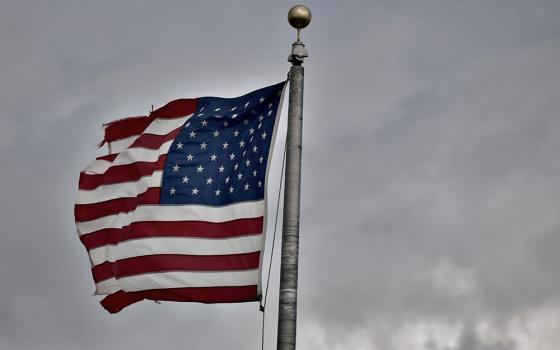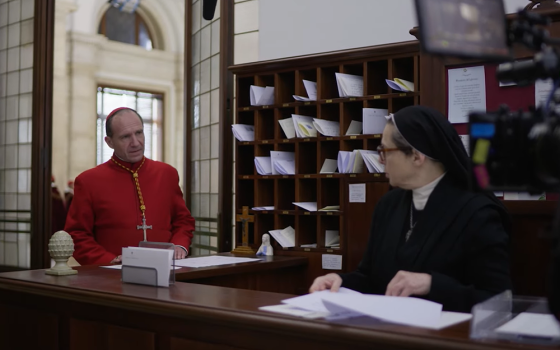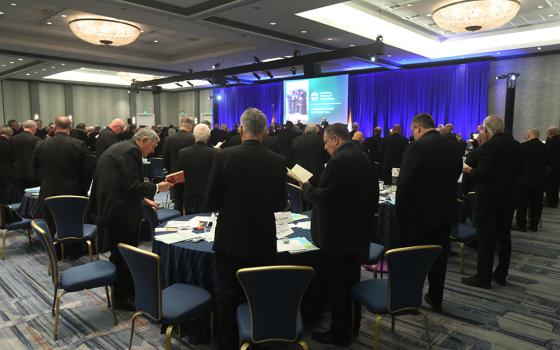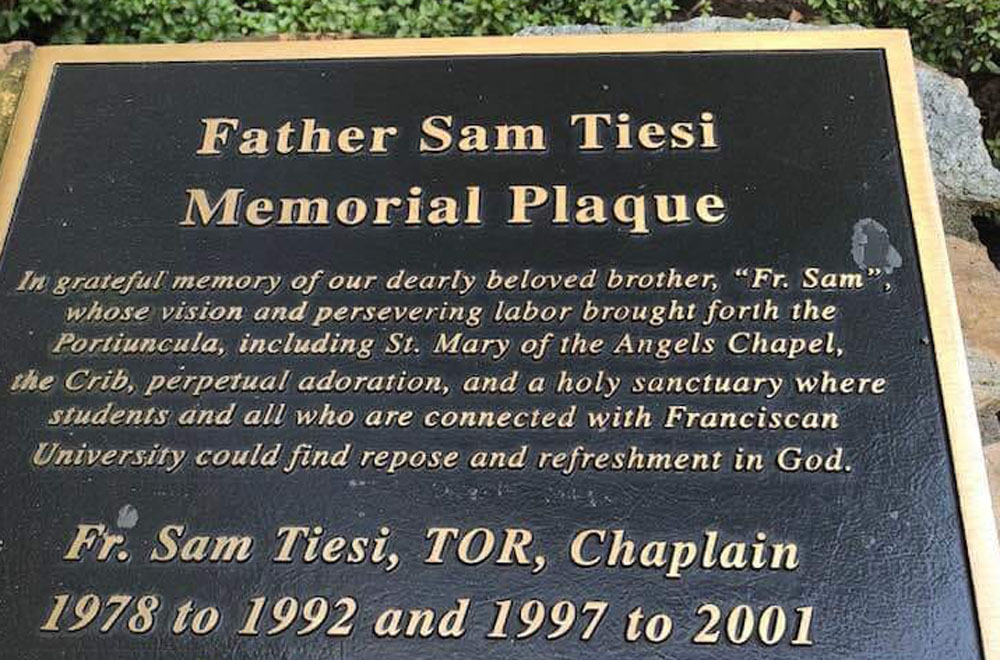
The plaque dedicated to Franciscan Fr. Sam Tiesi in 2006, pictured Aug. 7 at the Portiuncula Chapel of Franciscan University of Steubenville, Ohio (Provided photo)
The Portiuncula Chapel on the campus of the Franciscan University of Steubenville, Ohio, is, according to university material, "a grace-filled haven for quiet meditation ... set aside for private prayer and Eucharistic adoration."
The chapel is a pilgrimage site and the Vatican's Apostolic Penitentiary has decreed that Catholic faithful who pray there receive a "plenary indulgence," releasing them, according to church teaching, from temporal punishment due to sin and reducing their time in purgatory after their deaths.
Its construction was the passion of Franciscan Fr. Samuel Tiesi, a revered campus minister at Franciscan University who died in 2001. Tiesi proposed the project, designed the chapel and raised most of the money to build it.
A plaque stood at the entrance to the chapel walkway, dedicating the chapel to Tiesi. His portrait hung in the chapel until Sept. 10, when the plaque was covered and the portrait removed. Eventually, the plaque was also removed, an empty pedestal left in its place. That small action exposed a 30-year-old secret: that Tiesi — part of the trinity of Franciscan priests including Michael Scanlan and Augustine Donegan, best friends, who made Franciscan University a model conservative Catholic university — was a serial abuser of young women.
The school administration and Tiesi's religious superiors knew of the friar's grooming and assault of female university students for years but took no action. Students who reported the abuse to university officials tell of being chastised, demeaned and made to feel they were betraying the friars and God.
When a victim reported her abuse to the Diocese of Steubenville and the local ordinary barred Tiesi from public ministry, he was reassigned to a friary in Virginia, where he celebrated Masses at a nearby Catholic high school.
Later, after being diagnosed with an incurable degenerative disease, Tiesi would return to the main campus of Franciscan University, his ministry ban lifted, and resume chaplain duties. Scanlan, the president of Franciscan University for 26 years and then chancellor for 11 more, reportedly told one victim it was a blessing that Tiesi was allowed to live out his final days on the campus that he loved.
The Steubenville administration this year pledged to counteract sexual assault on campus with new, more transparent procedures.
But the story Karen tells — she asked that her last name not be used — is both of institutional tolerance of abuse as well as of the sometimes long and difficult struggle a victim can experience in dealing with abuse.
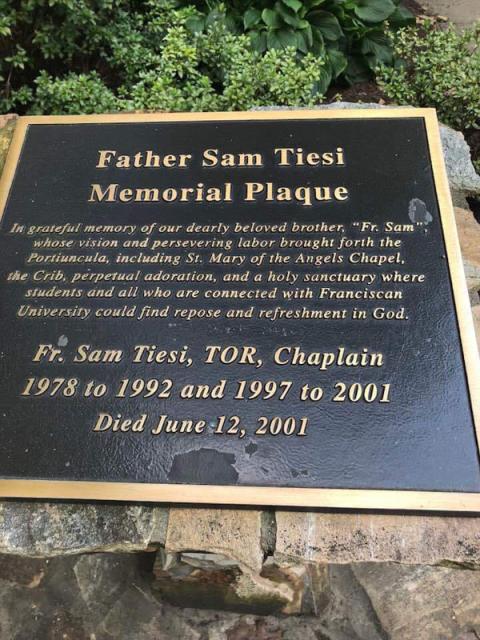
The plaque dedicated to Franciscan Fr. Sam Tiesi in 2006, pictured Aug. 7 at the Portiuncula Chapel of Franciscan University of Steubenville, Ohio (Provided photo)
'He was a friar, so I must be wrong'
The Portiuncula Chapel, a replica of the chapel in Assisi, Italy, believed to have been built by St. Francis himself, was dedicated during parents' weekend in the fall of 1987. Also new to campus that fall was Karen, who a few weeks into her freshman year lost a loved one to suicide.
After a night of crying, Karen left her dorm room for the campus chapel. "I entered Christ the King Chapel early that Sunday morning, and grabbed the elbow of the first friar I saw," she told NCR. "It just happened to be Father Sam [Tiesi], the campus minister."
Karen stayed for Mass and prayed through her grief. After Mass, Tiesi approached her and asked her to come to his office the next day. Karen agreed.
Karen began spending a great deal of time with Tiesi. Meeting with him in his office, praying together in the chapel, taking walks across campus and preparing meals together in the friary kitchen using vegetables from Tiesi's personal garden. Karen said she was depressed and suicidal, but that her friendship with Tiesi was a lifeline. "Sam took me under his wing and began the slow process of teaching me to trust again," she said.
That spring, Karen and Tiesi were visiting a student in the hospital. While the other student slept, Karen recalls Tiesi looking around as if to see if anyone was nearby. "That seemed odd at the time. It made me a bit uncomfortable," she said. "Sam then leaned in like he was going to give me an innocent kiss on the cheek, but then his mouth was open and he was gently gnawing, biting on my cheek."
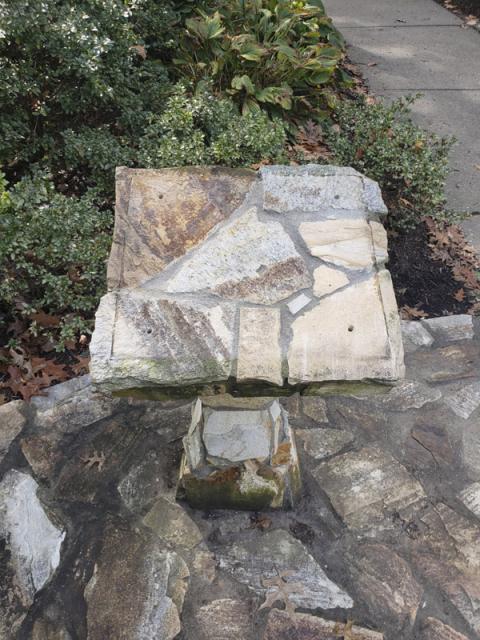
The pedestal underneath the plaque, after the plaque was removed, following Fr. Sean Sheridan's Sept. 10 letter. The pedestal is pictured Oct. 19 at Franciscan University of Steubenville, Ohio (Provided photo)
Karen froze, conflicted by her reaction. "I didn't trust my own judgment, but I trusted Sam completely," she said. "I wrote it off as 'Italian affection.' "
But Tiesi's behavior progressed.
"At first there was a barrage of hugs and kisses on the cheek, but then it got worse," Karen said. She remembers one occasion standing between Christ the King Chapel and the J.C. Williams Center where Tiesi wrapped Karen in a hug. "He said, 'Close your eyes, and I'll kiss you on the cheek!', but when I did, he kissed me on my lips and thrust his tongue into my mouth."
Similar moments happened across campus during walks, meals, and during meetings in Tiesi's office, located inside Christ the King Chapel. Sometimes it was a hand on her backside, other times Tiesi put his hand up her shirt. "He would enclose me in his arms and his black cloak, and I felt invincible," Karen said. "I felt enveloped and safe until he would start rubbing his erection on me."
Through Karen's sophomore and junior years, as the incidents increased in frequency and duration, Tiesi also drew Karen emotionally closer, weeping with her when she shared a personal burden and telling her he prayed for her. "I had never felt a bond so strong before in my life. He was weeping for my struggles, sharing deeply in my joy. He cared for me," Karen said.
But she also recalls being in a constant state of confusion. "How do you reconcile that the hands consecrating the Eucharist at Mass were up your shirt just a few hours earlier? That's easy," Karen said. "He was a friar, so I must be wrong."
At the beginning of her senior year, unsure of what to think, Karen confided in Fr. Michael Scanlan, then-president of the university. She told him about Tiesi's advances over the course of her time on campus, but she said he dismissed her complaints.
After meeting with Scanlan, who died in 2017, Karen confided in her friend and fellow dorm resident, Pam Monahan. In September, Monahan recounted that conversation of some 27 years ago. Karen was devastated when she returned from meeting with Scanlan, Monahan said. "She was sobbing ... because [Scanlan] turned it around and blamed her. He told her she was 'a troubled girl.' I felt helpless to do anything because she asked me not to say anything since she had already told Father Mike himself, and he blamed her."
"My only hope was that the church and the friars I loved so dearly would know what to do. I trusted them."
—Karen
Gradually, Karen said, she learned that Tiesi’s behavior was not a secret. Other women on campus had experienced similar behaviors from Tiesi that has lasted several years, she learned. Others had immediately distanced themselves from the priest, and one household on campus had dismissed Tiesi as chaplain because of his inappropriate behavior.
Karen said she and one of the other women, Deborah [name has been changed to protect anonymity],* disclosed to the campus counselor, Sally Lynch, what had been happening with both of them. With both women's permission, Lynch informed Fr. Jim Angert, then-leader of the friars on campus, about Tiesi. "My only hope was that the church and the friars I loved so dearly would know what to do. I trusted them," Karen said.
But weeks passed without hearing from Angert, so Karen stopped the priest outside the student center. His response was not what Karen expected.
"His words were accusatory and lacked any sensitivity," Karen said. "Right there, outside of the JC [the student center], he began to ask me very personal questions about Sam's behavior like, 'How and where did he touch you? Did he press himself against you or rub himself on you?' I felt like I was going to vomit. I muttered some words and took off."
Karen also sought the help of two other friars, Frs. Ron Mohnickey and Dan Sinisi, but while they seemed genuinely concerned for Karen, both dismissed her claims, telling her she must have misinterpreted Tiesi's behavior.
NCR contacted Angert, Mohnickey, and Sinisi to ask for their comment on Karen’s recollection, but only Angert replied, stating that all questions related to this matter were to be handled by the minister provincial.
"I don't think they were able to believe Sam could do this," Karen said. "In protecting Sam, the [friars] blamed us, too."
The weight of not being believed and the feelings of guilt proved too much for Karen. "I felt that I had betrayed the church by accusing a man of God. I felt that I had betrayed God. I had been left alone and in great confusion and pain by those I trusted most," Karen said. She planned her suicide, which was foiled by a roommate's unexpected return home.
Lynch — "the only person to stand up for me," Karen said, "the only one who took me seriously" — added Karen to a group therapy session comprising other victims of sexual harassment and abuse on campus. In sessions, other members revealed they had suffered abuse at the hands of priests on campus. Through the group, Karen found the strength to work through her trauma in order to complete her studies.
One last time before graduating, Karen approached Angert after a Mass. She again asked what Angert planned on doing with Tiesi. "His response floored me," Karen said. "He said that he had talked with Father Sam and that they decided together Sam would 'be more careful and spend more time in prayer.' I was stunned."
Karen returned home after graduation; she continued therapy and began spiritual direction with a trusted priest. That fall, she learned that Tiesi had been transferred from the main campus to the Gaming, Austria, program where he was chaplain. "We risked so much to tell them about our experiences, and yet they sent Sam to a location where he would be surrounded by students who were completely dependent on him in a foreign country," Karen said. "It was as if they were spitting in our face."
With the encouragement of a local priest, Karen and Deborah wrote detailed accounts of their experiences at the university and sent them to the Diocese of Steubenville. Although the diocese never replied to Karen or requested further information, their accounts must have proven credible, because the diocese removed the faculties for Tiesi in April 1992. The current chancellor, Fr. Bradley Greer, has confirmed this via diocesan records.
After Tiesi lost faculties, Karen visited Franciscan University. Leaving Mass in Christ the King Chapel, Scanlan pulled her aside. "He chastised me for going outside of the 'chain of command' by going to the diocese. He angrily told me I should have talked to the minister provincial," Karen recalled. "But how would I have known that?" Scanlan was furious. "I walked away from him terrified. This was the first time he brought any of this up since I had told him what happened, and all he wanted to do was yell at me. ... I was crushed by his response."
The current minister provincial of the Franciscans who run Franciscan University, Fr. Richard Davis, told NCR that he was unaware until recently that Tiesi's faculties had been removed, even though he became a vice president of the university the summer after Tiesi's faculties were removed, a position he held until May 2013.
After speaking with NCR, Davis checked in Tiesi's personnel file for any record of his loss of faculties, counseling or any other restrictions. "There is nothing in the records. Only his family of origin and a list of his assignments," Davis said.
Davis said only two persons would have known of the diocese's actions: Scanlan and then-minister provincial, Fr. Jordan Hite. Davis told NCR he was surprised by the allegations against Tiesi, and stresses, "If Father Sam were alive today, he would immediately be removed from ministry." When contacted by NCR, Fr. Jordan Hite refused comment, saying he would need to review the records and that all questions should be directed to the minister provincial.
But Tiesi wasn't removed from ministry; he was sent to Sacred Heart Friary in Winchester, Virginia, where he was to receive counseling and serve the older friars in need of living assistance. No restrictions were put on his movements, and one Franciscan University alumnus recalls Tiesi celebrating Mass at a local Catholic high school.
In 1995, Karen visited friends in Virginia, and together they visited Tiesi at the friary. "My therapist said this was a common reaction, wanting to reconcile," Karen said. "After giving us a tour, Sam told me that his counselor told him not to have any contact with me, and he added with a smile, 'But we don't have to tell him, do we?' which was the closest he got to broaching the subject." Karen said she apologized for hurting Tiesi and asked his forgiveness. "I took a misplaced responsibility for being victimized," she said, "And Sam let me do it."
After their visit, Karen began receiving letters from Tiesi. He continued to write her for years. Every card "always the same message," she said. "A beautiful paragraph about forgiveness, followed by an explanation of how it was my fault and that he forgave me." His letters ended the same each time as well. Karen said, "Then he would ask forgiveness for anything he did to hurt me, but always prefaced with, 'although I don't know what it was that I have done.' He continued to place the blame on my shoulders, and I accepted much of it."
Karen said Scanlan also called her about once a month. In 1997, he asked her a favor: Would she contact the Diocese of Steubenville and recant her accusations against Tiesi? "Sam had been diagnosed with myasthenia gravis, an incurable, degenerative neuromuscular disease, and wanted to return to the campus, which he loved, to live out the rest of his days. Father Mike told me, 'It would be a blessing to him.' "
Karen sent the letter of recant to the diocese. "Fr. Mike told me exactly what needed to be said, where to send it, and everything I needed to do. So, I did it," Karen said. “I believed that it was my fault. They told me all those years how I had made everything worse and how I had hurt them. I was sure that I was going to hell. I had betrayed these holy men. They offered me a way to ‘make it right’ so I jumped on it."
In the letter Karen sent to the diocese, she said she misinterpreted the events rather than saying they didn’t happen. "I recanted. Not because it wasn’t true," she said, "But because I took the blame. In retrospect, I can’t understand how anyone would accept that reasoning. How could an elderly priest shoving his tongue in the mouth of a woman barely 18 be misinterpreted?"
Deborah refused to recant her statement, but Tiesi's faculties were restored. He spent several more semesters on the campus as well as the Austrian campus, with no restrictions of any kind on his movements or interactions with students.
Karen would continue to visit Tiesi at the campus, often with Scanlan. At one point, Scanlan told Karen that "he knew Sam was guilty, but explained that the sexual misconduct was because 'Sam just loved you too much.' "
Karen recalls the last time she saw Tiesi. "I had a benign tumor and was about to have surgery, so they [Scanlan and Tiesi] gave me the anointing of the sick and both prayed over me," Karen said. "Sam was deteriorating at a rapid pace, and it was difficult to see him suffering like that. I wanted and needed forgiveness, because I felt like I had hurt Sam and by doing so I had hurt Father Mike by separating him from his best friend. I accepted this false guilt, so when we 'reconciled,' I was sure life would get better."
That feeling, however, was short-lived.
"It was a complete slap in the face that this happened immediately after my settlement."
—Karen
Karen continued counseling and spiritual direction, struggling to reconcile her faith with what had happened to her. Tiesi passed away in September of 2001, and not long after, the Boston scandal broke. Another beloved priest from Franciscan University, Fr. John Bertolucci, was revealed to have sexually abused teenagers. Those stories made Karen consider the cost of silence. Although Tiesi was no longer a danger to anyone, Karen realized through her therapy that she had been treated unjustly, and she wanted to help the order prevent any future victims from being blamed or victimized further by inaction.
To that end, Karen requested a settlement from the Franciscan friars. Her terms were simple: first, reimbursement for the costs of her therapy, for which she meticulously totaled and provided receipts in the amount of $34,448.00. (NCR has seen a copy of the settlement.) Second, Karen outlined continuing education guidelines for the friars as well as a plan put in place for any potential victims. And lastly, two face-to-face meetings with the minister provincial at the time, Fr. Christian Oravec. "I needed to be real to him," Karen said, "I didn't want to be just a person on the other end of the phone."
After four years of emails, phone calls, letters involving lawyers, priests and other advisers, the order settled with Karen in 2006. Karen did not ask for anything beyond reimbursement for her counseling, even though she was now a struggling single mother. "I didn't want to take any more money from the laity, and I knew that's where it would come from," Karen said.
The same year the Franciscans settled with Karen, the university dedicated the Portiuncula Chapel to the "grateful memory of our dearly beloved brother, 'Fr. Sam'." "It was a complete slap in the face that this happened immediately after my settlement," Karen said.
Advertisement
Lifetime of healing needed
A dozen years later, on Sept. 10, Fr. Sean Sheridan, the current president of Franciscan University reported to the campus and alumni, that he had received a new credible report of "unwanted sexual advances" by Tiesi, and he was ordering the late friar's portrait and dedication plaque be removed from the Portiuncula Chapel.
Sheridan's announcement came less than two weeks after he had made a public commitment to stop sexual violence and harassment on campus and encouraged victims to come forward, acknowledging the obligation of the university to investigate all claims.
The university has engaged the law firm, Husch Blackwell LLP, to review their records of past abuse investigations. A report is due by January, with Sheridan stating it will be shared with the university's board of trustees who will decide whether or not to share the results with the wider public.
When asked for comment on the claim that Father Scanlan knew about Tiesi’s behavior, university officials responded, "To maintain the integrity of the review process and confidentiality, the University will not provide further comments while this review is under way."
Davis has invited anyone with an allegation of sexual abuse against any of the friars report the accusation either through a form on the order's website or by contacting him directly.
As for Karen, she continues to work to come to terms with what Tiesi did. "He saved my life only to nearly cost me my life," she said. "This is a wound that will take a lifetime to heal."
[Jenn Morson, a Franciscan University of Steubenville graduate, is a freelance writer based in the Washington, D.C. area.]
*This story has been updated to note that Deborah's real name has been changed to protect her anonymity.

